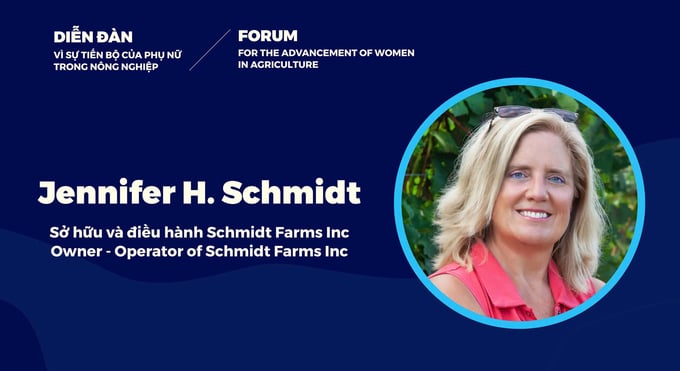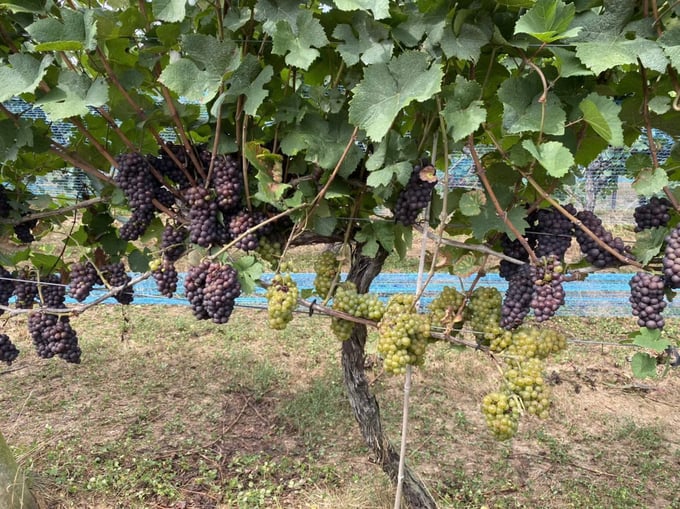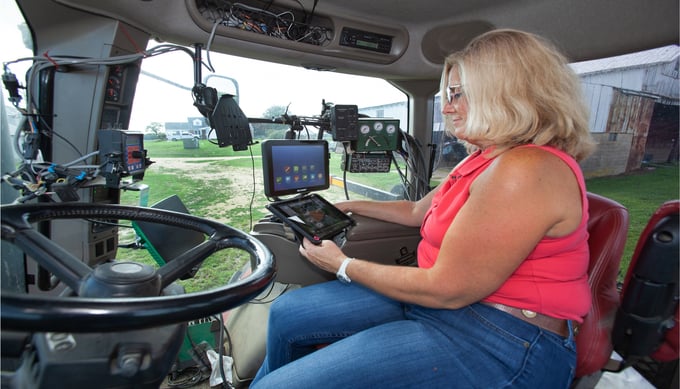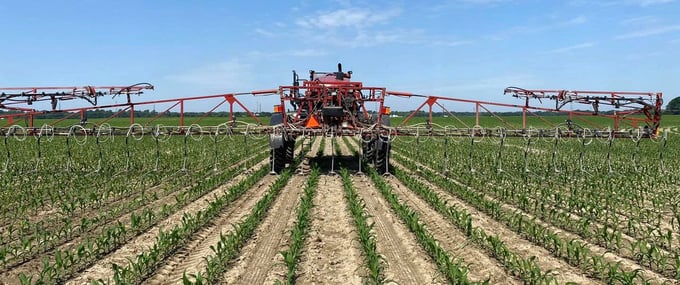May 21, 2025 | 09:05 GMT +7
May 21, 2025 | 09:05 GMT +7
Hotline: 0913.378.918
May 21, 2025 | 09:05 GMT +7
Hotline: 0913.378.918

In May 2024, the United Nations General Assembly passed a resolution declaring 2026 as the "International Year of Women Farmers," calling on the world to respond to the "International Year of Women Farmers." The UN resolution draws global attention to women in agriculture.
To promote the implementation of the UN resolution declaring 2026 as the "International Year of Women Farmers"—a global initiative led by a core group including the United States and Vietnam, and implemented by the Food and Agriculture Organization of the United Nations (FAO) in cooperation with other UN agencies—the U.S. Mission to ASEAN and the USDA will organize the "International Year of Women Farmers Program" in Vietnam from August 12-13, 2024. Vietnam Agriculture Newspaper will provide media sponsorship, focusing on promoting dialogue about the challenges faced by women farmers in Southeast Asia.
The program will bring two outstanding women farmers from the United States, Ms. Jennifer H. Schmidt and Ms. Jaclyn Wilson, to Vietnam and Indonesia to meet with women in the agricultural community. These dialogues aim to raise awareness about the issues women in global agriculture are facing.
Ahead of the event, Ms. Jennifer H. Schmidt shared a brief discussion with Vietnam Agriculture Newspaper about her career in farming and her efforts to promote the participation and role of women in agriculture.
Jennifer H. Schmidt operates a farm spans a couple thousand acres—about 800 hectares—a scale that is impressive by any standard, particularly in comparison to farming operations in many other parts of the world, including Vietnam. "Our farm is highly mechanized," she explains, noting that this level of automation is essential for managing such a large area.

Jennifer H. Schmidt operates a farm spans a couple thousand acres—about 800 hectares—a scale that is impressive by any standard. Photo: courtesy of Ms. Jennifer.
The farm grows a variety of crops—grains, fruits, and vegetables—and almost everything is done by machines, from planting to harvesting.
Mechanization is a key aspect of modern farming in the United States, especially for operations of this size. “Our vegetables, like the green beans we're about to harvest, are completely mechanically handled. No human hand ever touches them—they're planted, managed, and harvested entirely by machines.”
This reliance on technology is what makes the scale of her farm manageable. “Without mechanization, we either wouldn’t be as diversified as we are, or we simply wouldn’t be able to get everything done,” she says. This is a contrast to smaller farms or those in less industrialized nations, where much of the work is still done by hand.
Even within the U.S., the level of mechanization can vary greatly depending on the size of the farm and the type of crops being grown, the woman farmer elaborated.

The vineyard, which spans 22 acres, is semi-mechanized, with most of the work still done by hand. Photo: courtesy of Ms. Jennifer.
Despite the high level of automation, some parts of her operation remain hands-on. The vineyard, which spans 22 acres, is semi-mechanized, with most of the work still done by hand. This is where her seasonal crew of workers plays a crucial role from February through September or October, depending on how long the harvest takes, she explains. The staggered ripening of different wine grapes varieties means that the harvest is a drawn-out process, requiring skilled hands to manage it.
Farming is not this farmer's first career. Her first career was as a registered dietitian. After graduating from college and completing the clinical internship, Jennifer worked as a dietitian in a hospital for several years. However, she found that her passion lay elsewhere, and her background in nutrition became unexpectedly relevant when she transitioned into farming.
She realized that a degree in nutrition is essentially a study of biology and chemistry, and those disciplines are just as applicable to agriculture as they are to human health. Plants and soils need nutrition, just like people do, and the same scientific principles apply.
This transition was not without its challenges. "When I first started farming, I had to prove myself," she recalls. "It's always been part of my personality that if someone tells me I can't do something, I’ll show them that I can." Proving her capability on the farm meant pulling her own weight alongside the men, tackling the same physically demanding tasks and making decisions on par with her male counterparts.

Ms. Jennifer Schmidt with her tools to operate the farm. Photo: courtesy of Ms. Jennifer.
Her journey into agriculture also involved seeking out mentorship and building a network of support, particularly among other women in the industry. As she became more involved in agricultural commodity groups, Jennifer met other women who were already leaders in their states or at the national level. These women became mentors and friends, inspiring her to set goals and pursue leadership roles myself, she says. "Now, I try to pay it forward by mentoring younger women through programs like 4-H (Head, Heart, Hand, Health) and FFA (Future Farmers of America). I want to show them that there are no limits to what they can achieve in agriculture."
As the world of agriculture becomes increasingly interconnected, this farmer's participation in international agricultural discussions and trade missions is a testament to the global nature of farming today. Her upcoming trip to Vietnam is part of a broader effort to engage with farmers and agricultural experts worldwide, sharing knowledge and learning from different practices.
Agriculture, she believes, plays a crucial role not only in food security but also in social stability. "Without food, you have unrest and health issues," she says. Her involvement with the U.S. Grains Council, an organization focused on promoting U.S. grain exports, underscores the importance of agriculture in meeting global food needs.

Agriculture, she believes, plays a crucial role not only in food security but also in social stability. Photo: courtesy of Ms. Jennifer.
In this context, she also reflects on the importance of education and continuous learning in agriculture. "In the U.S., we have university extension programs that offer farmers ongoing education and access to the latest research and science-based information," she explains. "Even without a formal degree in agronomy, farmers can still learn and apply new techniques to improve their operations. This non-traditional outreach is crucial for staying competitive and sustainable in today's agricultural landscape."
Jennifer H. Schmidt (Sudlersville, Maryland): Originally trained in a medical specialty, Jennifer currently runs Schmidt Farms Inc., a Certified Agricultural Management farm spanning over 800 hectares, where she cultivates corn, soybeans, wheat, vegetables, and wine grapes. She is also a licensed expert in pesticide application and nutrient management.
Jennifer serves as the Director of Schmidt Farm and is a communication consultant specializing in agriculture and nutrition. She provides expertise and training programs on agricultural production, biotechnology, agricultural systems, and sustainable development.
Previously, Jennifer owned Schmidt Vineyard Management LLC and worked as a Registered Dietitian Nutritionists (RDNs) for healthcare and educational organizations, with extensive experience in clinical nutrition and youth education initiatives. She holds a Master’s degree in Human Nutrition from the University of Delaware, with advanced training in dietetics and agriculture.

(VAN) In 2024, over 295 million people across 53 countries and territories faced acute hunger—an increase of almost 14 million people compared to 2023, while the number of people facing catastrophic levels of hunger reached a record high.

(VAN) World Environment Day 2025 (June 5) carries the theme 'Beat Plastic Pollution' continuing to emphasize the global urgency of addressing the plastic waste crisis.

(VAN) This was the assessment shared by experts at the workshop titled 'Assessing the Role and Potential of Low-Emission Rice Production Systems in Vietnam,' held on the morning of May 19.

(VAN) Cai Rong Port is the fisheries control center of Quang Ninh, helping to monitor fishing vessels, combat IUU fishing, and remove the EC's 'yellow card'.

(VAN) The German Agricultural Society (DLG) explores the possibility of establishing a mechanization service center in Vietnam’s Mekong Delta to support farmers in accessing and utilizing advanced machinery.

(VAN) On May 16, the Department of Water Resources Management, in collaboration with the Food and Agriculture Organization of the United Nations (FAO), held a signing ceremony for the GEF-8 project document.

(VAN) Food safety, mechanization, vocational training, and market opening are key areas of cooperation expected between the Vietnamese Government and the Federal Republic of Germany.